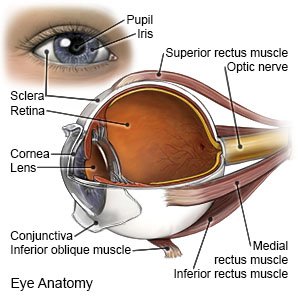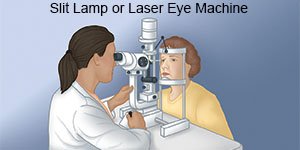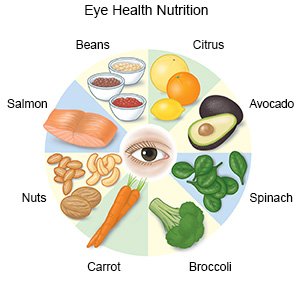Retinitis Pigmentosa
Medically reviewed by Drugs.com. Last updated on Aug 4, 2025.
What is retinitis pigmentosa (RP)?
RP is a group of diseases that cause cells in the retina called rods to break down. Rods help you see at night and in low light. The retina is a thin layer of tissue that lines the back of your eye. The retina captures light and sends messages to your brain. The cell breakdown leads to vision loss that gets worse over time and may lead to blindness. Both eyes are affected, but one eye may have more severe vision loss than the other. RP is genetic (passed down through families). The genes may come from one or both sides of your family.
 |
What are the signs and symptoms of RP?
Signs and symptoms usually begin in childhood. You may develop any of the following:
- Not being able to see well at night or in darkness
- Trouble seeing when light becomes dim
- Sensitivity to bright light
- Loss of peripheral (side) vision
- Loss of ability to see color
- Loss of central vision
- Complete loss of vision
How is RP diagnosed?
Your healthcare provider will ask about your symptoms and when they started. Tell your provider if you have any medical conditions or take any medicines. Tell your provider if you have a family history of RP. Family members other than your parents may have RP. You may also need any of the following:
- An eye exam is used to check your retina and test how well it responds to light. You will be asked to read letters on a chart on the wall. Your ability to see color will also be tested. You may need eye drops to dilate (widen) your pupils. This allows your provider to look for dark spots on your retina that RP produces.

- Genetic testing will help find the type of RP you have. Your symptoms may change over time, depending on the type.
How is RP treated?
RP cannot be cured. The goal is to slow the process so you keep as much vision as possible.
- Medicines may be given if you have macular edema (swelling). The macula provides central vision. Your healthcare provider may also recommend vitamin A supplements. Your healthcare provider will tell you how much to take each day. Do not take more than recommended. Large doses of vitamin A can be harmful.
- Surgery may be available to place an implant into one of your eyes. The implant is connected wirelessly to eyeglasses that have a camera. The implant sends electrical impulses to your retina. The implant will not restore lost vision, but it may help you see some light and objects.
What can I do to manage RP?
- Go to vision rehabilitation (rehab). A rehab therapist can help you learn ways to keep your home or workplace safe. The therapist can also help you choose vision tools or devices. Examples include corrective and magnifying glasses, large print materials, and calculators with large number pads. Computer programs that read text aloud or type as you speak may also be helpful.
- Get an eye exam as often as directed. Your provider will check for problems RP can cause. You are also at increased risk for other eye problems that may need treatment, such as cataracts. Your provider will also ask about any new or worsening RP symptoms you have had since your last visit.
- Improve the lighting in your home. Increase the amount of light to help you see objects better. Use light bulbs that reduce glare. Ask your provider which types of light bulbs you should use or avoid.
- Eat foods that contain eye-healthy nutrients. Healthy nutrients include vitamin A, vitamin C, vitamin E, omega-3 fatty acids, lutein, and zeaxanthin. They can be found in foods such as spinach, peanuts, salmon, collard greens, avocados, squash, eggs, and blueberries. Ask your healthcare provider for a full list of foods that contain eye-healthy nutrients. You may also need to take vitamins or supplements to help you get enough of these nutrients. Your provider can tell you which vitamins or supplements to take, and how much to take each day.

- Protect your eyes from the sun. Always wear sunglasses with ultraviolet (UV) protection lenses when you are outdoors. Your provider may recommend that you avoid direct sunlight.
- Do not smoke. Nicotine and other chemicals in cigarettes and cigars may worsen RP. Ask your provider for information if you currently smoke and need help to quit. E-cigarettes or smokeless tobacco still contain nicotine. Talk to your provider before you use these products.
Where can I find more information and support?
- National Eye Institute, National Institutes of Health
202 Vision Pl.
Bethesda , MD 20892-3655
Phone: 1- 301 - 496-5248
Web Address: www.nei.nih.gov
- Macula Vision Research Foundation
Five Tower Bridge 300 Barr Harbor Drive, Suite 600
West Conshohocken , PA 19428-2984
Phone: 1- 610 - 6686705
Phone: 1- 866 - 4622852
Web Address: www.mvrf.org/supportsight/
When should I seek immediate care?
- You have a sudden change in your vision or loss of vision.
When should I call my doctor?
- You have questions or concerns about your condition or care.
Care Agreement
You have the right to help plan your care. Learn about your health condition and how it may be treated. Discuss treatment options with your healthcare providers to decide what care you want to receive. You always have the right to refuse treatment. The above information is an educational aid only. It is not intended as medical advice for individual conditions or treatments. Talk to your doctor, nurse or pharmacist before following any medical regimen to see if it is safe and effective for you.© Copyright Merative 2025 Information is for End User's use only and may not be sold, redistributed or otherwise used for commercial purposes.
Learn more about Retinitis Pigmentosa
Treatment options
Symptoms and treatments
Further information
Always consult your healthcare provider to ensure the information displayed on this page applies to your personal circumstances.
